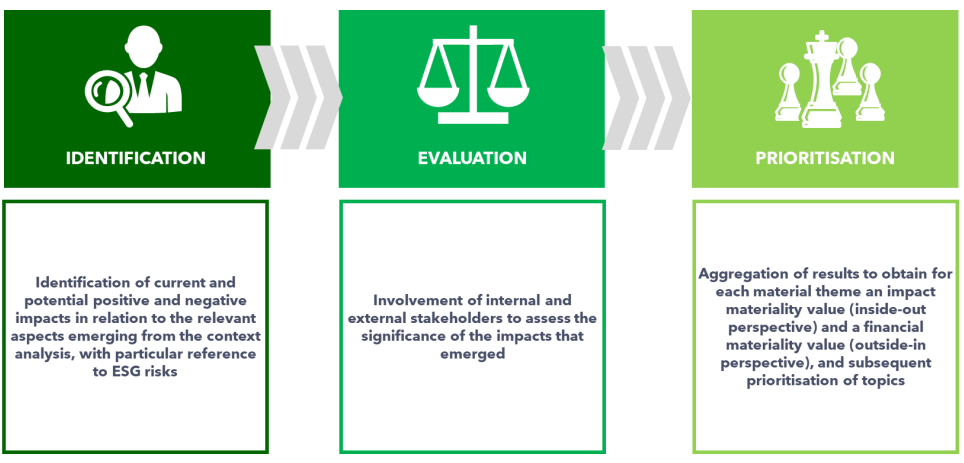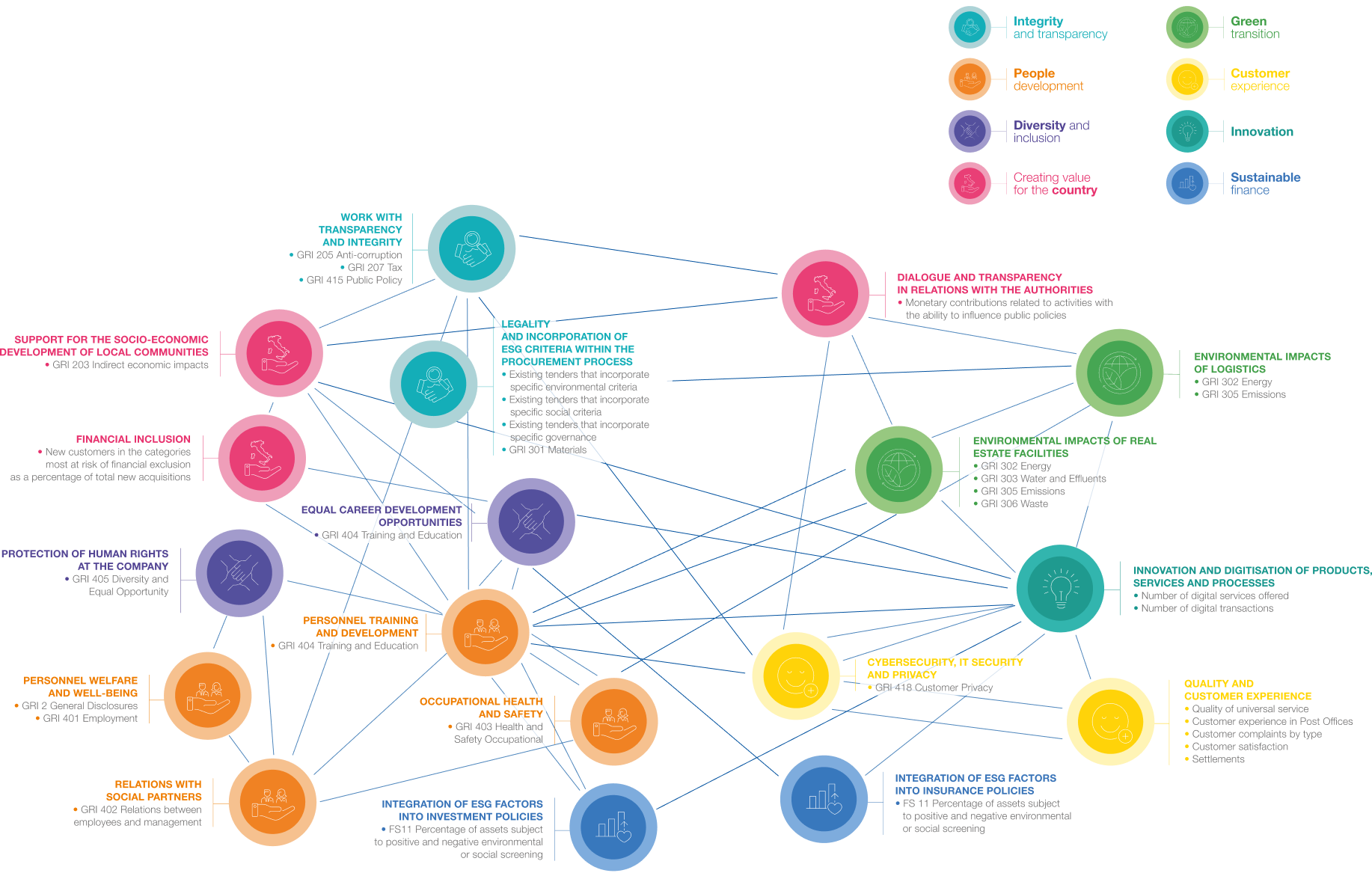Material sustainability themes for Poste Italiane
Poste Italiane has developed a materiality analysis process aimed at identifying priority issues, based on the significance of their related impacts, to be included in the Group's Sustainability Strategy and to be formalised in terms of policies and targets.
With a view to continuous improvement, in 2023 Poste Italiane continued with the approach initiated in 2021 and subsequently finalised in 2022, aimed at anticipating the application of the principle of double materiality envisaged by the Corporate Sustainability Reporting Directive (CSRD) before its entry into force, set for financial year 2024. During 2023, the Company initiated an assessment process aimed at analyzing and evaluating the regulatory requirements under the Corporate Sustainability Reporting Directive (CSRD) and the disclosure requirements and KPIs s under the European Sustainability Reporting Standards (ESRS) with respect to its sustainability reporting. Therefore, the Group has maintained the alignment of its materiality analysis methodology to the 2021 update of the GRI standards for impact materiality (inside-out perspective), taking into account the EFRAG provisions, contained in the new sustainability standards and the Double Materiality Guideline, although still in draft form, for financial materiality (outside-in perspective). The European Sustainability Reporting Standards, developed by EFRAG in anticipation of the CSRD, were finally adopted by the European Commission on July 31, 2023. The final version of the Delegated Act with the text of the first set of "Sector Agnostic" ESRSs was published in the U Official Journal on December 22, 2023, with entry into force on January 1, 2024.
The process of defining the material topics, which was finally approved by the Board of Directors, consisted of the following three steps:

To identify current and potential positive and negative impacts, an in-depth scenario analysis was conducted on the Group's activities, its business relations, the sustainability context in which it operates and the expectations of its stakeholders. This analysis took into account the provisions of regulatory sources and the main international sustainability guidelines, the Strategic Plan and the Group's risk management model, as well as the requirements of the main questionnaires prepared by ESG rating agencies and analyses of current industry trends.
The materiality matrix, shown below, graphically represents the result of the process of identifying priority issues starting from the assessment of the materiality of the impacts related to them, according to a dual perspective: impact materiality and financial materiality. Each of the 18 material themes is associated with an impact materiality value and a financial materiality value, obtained by multiplying the magnitude and probability of the individual impacts pertaining to the same material theme. The order of priority of the topics was established on the basis of the values obtained and through the definition of a materiality threshold.
This matrix constitutes an effective tool to support the Group's Sustainability Strategy and is the result of the process of alignment to the new GRI provisions for the impact materiality perspective, which is also influenced by the EFRAG provisions, contained in the ESRS standards and the Double Materiality Guideline, although still in draft form, for the financial materiality perspective.
MATERIALITY MATRIX
Description of material topics
| Number | Material topics | What this means for Poste Italiane |
|---|---|---|
| 1 | Innovation and digitisation of products, services and processes | Contribute to the modernisation of Italy and digital and technological evolution through the development of new products and services and the adoption of digital technologies to be incorporated into products, services and business processes, in order to be ready to respond to changes in scenario, new customer needs and opportunities offered by social and environmental changes. |
| 2 | Quality and Customer experience | Respect implementation deadlines and procedures for activities (level of service and performance) and provide customers with a quality experience that goes beyond making use of a traditional product or service. In addition, build a relationship of trust by activating customer engagement channels to be always informed on customers’ expectations, needs and satisfaction regarding products and services offered, and the correct management of complaints. |
| 3 | Staff training and development | Guarantee our employees ongoing development of their knowledge and skills and the opportunity to reach their full potential through training courses aimed at ensuring growth and strengthening of know-how in line with the needs they and the market have expressed, also with a view to better managing business and organisational changes. |
| 4 | Work with transparency and integrity | Prepare appropriate internal control measures and spread a corporate culture within the organisation based on integrity, professional ethics and honesty in order to build trusting relationships with its stakeholders and conduct its activities correctly and transparently in single operation, especially in combating active and passive corruption. |
| 5 | Support for the socioeconomic development of local communities | Contribute to Italy’s socio-economic well-being through direct, indirect and induced impacts in local areas (e.g. in terms of GDP and employment), and initiate or support social activities that respond to the needs expressed by society, including those identified through dialogue and collaboration with the third sector. |
| 6 | Occupational health and safety | Safeguard people’s health, safety and psychophysical integrity, also in terms of workplace quality, and foster the development of a robust in-company culture in compliance with the highest national and international standards in this regard. |
| 7 | Financial inclusion | Extend the financial products and services offering to traditionally excluded categories, in order to guarantee access to services that are essential for economic livelihoods, and make the customer purchasing experience more aware via financial education initiatives, especially with regard to savings, investment, payments, pensions and insurance. |
| 8 | Protection of human rights at the Company | Guarantee the protection of human rights and the promotion of non-discriminatory behaviours within the Group, including through compliance with recognised standards, incorporation of the risk of violation within the Group’s risk assessment model, and valorisation of diversity elements (in terms of differences in age, gender, knowledge and experience) which foster the development of a “corporate culture” and a response to new challenges and market opportunities. |
| 9 | Cybersecurity, IT Security and Privacy | Guarantee the privacy of customers’ data, protect intellectual property and provide an effective management system for IT security and cyber security in order to ensure business continuity, protect the information assets of the Company, customers and other stakeholders, and the security of transactions. |
| 10 | Environmental impacts of real estate facilities | Spread a culture of respect for the environment and adopt concrete solutions for the efficient management of energy resources, water resources and waste, from a circular economy standpoint. For example, procurement of renewable energy, installation of renewable energy production plants, building efficiency projects, organisation of separate waste collection, etc. |
| 11 | Staff welfare and wellbeing | Provide employees with modern, flexible working tools and models that respond to specific personal needs and ensure work-life balance (e.g. agile working initiatives, improved maternity and paternity arrangements, the provision of benefits in the field of healthcare, etc.). |
| 12 | Legality and incorporation of ESG within procurement processes | Procurement processes based on pre-contractual and contractual behaviours aimed at achieving complete respect of legality and transparency, and adoption of selection, assessment and monitoring criteria to measure the social and environmental performance of suppliers, in order to guarantee high levels of functionality and quality for supplies and mitigate potential ESG risks. |
| 13 | Equal career development opportunities | Ensure equal opportunities in the development of individual careers, by promoting career development paths for all employees regardless of their personal characteristics (age, gender, sexual orientation, disability, ethnic origin, nationality, political opinions and religious beliefs) in accordance with the principles of impartiality and non-discrimination. |
| 14 | Relations with social partners | Consider dialogue with personnel and labour union representatives as essential in finding shared solutions relating to issues that can have significant impacts on the organisation, the business and above all human capital, a vital corporate asset for the Company. |
| 15 | Environmental impacts of logistics | Monitor the environmental impact of logistics activities and encourage a process of change aimed at safeguarding the environment by adopting lower-impact solutions regarding the provision of postal and logistics services, including: the use of hybrid/electric vehicles, rationalisation of distances travelled, correct waste management, and development of recharging infrastructure for customers’ vehicles. |
| 16 | Dialogue and transparency in relations with the authorities | Promote systematic and transparent dialogue with national and local authorities, based on a quest for shared solutions that enables responding to communities’ social needs, positively affecting the social fabric in the areas in which the Company operates and, at the same time, increasing competitiveness and business continuity. |
| 17 | Integration of ESG factors into investment policies | Incorporate ESG aspects within the investment process in order to better manage nonfinancial risks and consider new investment opportunities that also support sustainable development and a low-carbon future. |
| 18 | Integration of ESG factors into insurance policies | Incorporate ESG aspects within insurance policies, insurance product development strategies and customer communications. |
Interconnection between material issues and metrics
The integrated approach adopted by Poste Italiane takes into account the combination, correlation and interdependence of issues that have a material impact on the Group's economic, social and environmental performance. In this contest, the decision-making process, which includes specific actions aimed at the pursuit of sustainable success, considers the connections and interdependencies between all factors that influence the Company's ability to create sustainable long-term value. To this end, in accordance with the indications of the International Framework, the interconnections between the material issues for Poste Italiane and the main measurement metrics adopted are shown below.



